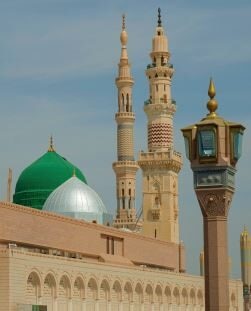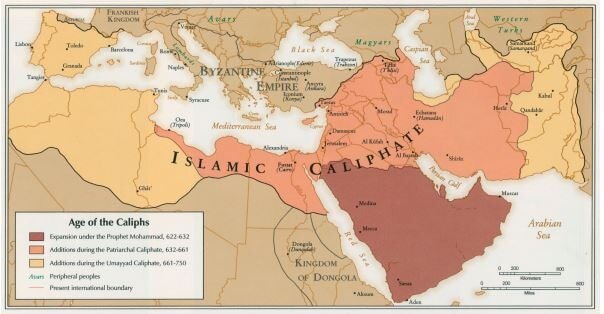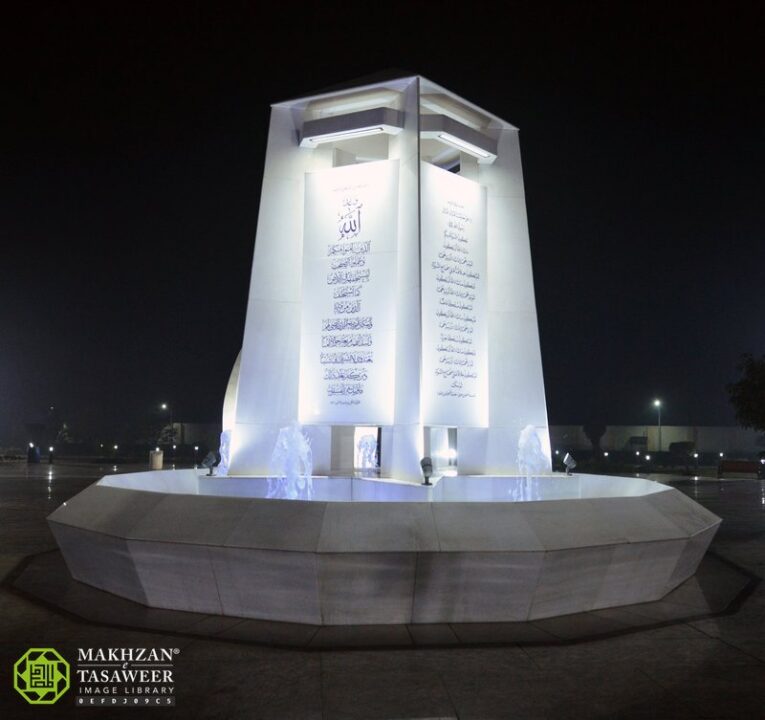Jalees Ahmad, Al Hakam

1400 years ago, the Holy Prophetsa, whilst addressing his Companionsra and describing the future of Islam, said:
تكون النبوة فيكم ما شاء اللّٰه أن تكون، ثم يرفعها اللّٰه إذا شاء أن يرفعها، ثم تكون خلافة على منهاج النبوة فتكون ما شاء اللّٰه أن تكون، ثم يرفعها اللّٰه إذا شاء أن يرفعها، ثم تكون ملكًا عاضًا فيكون ما شاء اللّٰه أن يكون، ثم يرفعها إذا شاء اللّٰه أن يرفعها، ثم تكون ملكًا جبرية فتكون ما شاء اللّٰه أن تكون، ثم يرفعها اللّٰه إذا شاء أن يرفعها، ثم تكون خلافة على منهاج النبوة، ثم سكت
“Prophethood shall remain among you as long as Allah wills. He will bring about its end and follow it with Khilafat on the precepts of prophethood for as long as He wills and then bring about its end. Kingship shall then follow, to remain as long as Allah wills and then come to an end. There shall then be monarchical despotism which shall remain as long as Allah wills and come to an end upon His decree. There will then emerge Khilafat on the precepts of prophethood.” Prophet Muhammadsa then became silent.” (Musnad Ahmad bin Hanbal, Kitab al-Riqaq, Bab al-Andhar wa al-Tahdhir)
These were the prophetic words of the Holy Prophetsa in which he laid out the future events of Islam. In this hadith, four stages have been highlighted, which we shall cast a glance over and explain in this article.
The authenticity of this hadith is strengthened by a verse of the Holy Quran. In Surah al-Nur, Allah the Almighty has promised those who believe and do good works that “He will surely make them Successors in the earth, as He made Successors from among those who were before them; and that He will surely establish for them their religion which He has chosen for them; and that He will surely give them in exchange security and peace after their fear: They will worship Me, and they will not associate anything with Me. Then whoso is ungrateful after that, they will be the rebellious.” (Surah al-Nur, Ch.24: V.56)
Under this verse, it is stated in the Five-Volume Commentary that the promise of the establishment of Khilafat is clear and unmistakable. “As the Holy Prophet is now humanity’s sole guide for all time, his Khilafat must continue to exist in one form or another in the world till the end of time, all other Khilafats having ceased to exist.” (Five-Volume Commentary, Surah al-Nur, Ch.24: V.56, p. 2289)
The establishment of Khilafat after prophethood is a recurring theme in history. Khilafat is established to further propagate the mission of the prophet to his people. The Holy Prophet, on one occasion, is reported to have said:
مَا كَانَتْ نُبُوَّةٌ قَطُّ اِلَّا تَبِعَتْهَا خِلَافَةٌ
“There had not been any Prophethood which was not succeeded by Khilafat.” (Kanz al-Ummal, Hadith 32246)
Three types of khulafa mentioned in the Holy Quran
In the Five-Volume Commentary, under the aforementioned verse of Surah al-Nur, we read about the three types of Khilafas the Holy Quran mentions.
The first kind is those khulafa who are prophets of Allah, for example, Prophet Adamas: “I am about to place a vicegerent in the earth” (Surah al-Baqarah, Ch. 2: V. 31), and Prophet David: “O David, We have made thee a vicegerent in the earth” (Surah Sad, Ch.38: V.27), both of whom the Quran says were khulafa.
The second type of khalifa mentioned in the Holy Quran is those prophets who were khulafa of another prophet. For example, the Prophets of Israel were all the khulafa of Prophet Mosesas. Alluding to these khulafa, Allah the Almighty states, “Surely, We sent down the Torah wherein was guidance and light. By it did the Prophets, who were obedient [to Us], judge for the Jews”. (Surah al-Maidah, Ch.5: V.45)
The third type is “non-prophet khulafa of a prophet, with or without temporal powers, such as godly people learned in the Law. Their mission is to protect and preserve the law from being tampered with.” (Five-Volume Commentary, Ch.24: V.56, p. 2289)
Verse 56 of Surah al-Nur “covers all these categories of khulafa, viz. the Holy Prophet’s rightly-guided khulafa, the Promised Messiah, his successors and the spiritual reformers or mujaddids.” (Ibid)
A look into the meaning of the hadith ‘Khilafat on the precepts of prophethood’
The Holy Prophetsa has, in the hadith cited at the start, structurally presented the events of the future of Islam. He said that after prophethood, Khilafat would follow. After Khilafat would follow kingship which would then be followed by monarchical ruling. Then, one of the key aspects which should not be ignored is what the Holy Prophetsa said next. He said that there would then emerge “Khilafat on the precepts of prophethood” after which he said no more and became silent.
Studying the annals of history, we see that after the demise of the Holy Prophetsa, Khilafat was established with Hazrat Abu Bakrra being elected as Amir-ul-Momineen; succeeding him, one after the other, were Hazrat Umar, Hazrat Uthman, and Hazrat Ali, may Allah be pleased with them all. This Khilafat is known as the “Rightly-Guided Khulafa” which remained from the years 632-661 CE.
Following “Khilafat” mentioned in the above-quoted hadith, we read “Kingship shall then follow”. This era of “kingship” remained from 661-1516 CE. This period was full of leaders from the Banu Umayyad (661-749 CE), Banu Abbas (749-1516 CE) and Banu Fatima (10th-12th CE).
Referring to this successorship, the words the Holy Prophetsa used were مُلْكًا عاضًّا meaning that a dividing monarchy would take shape. The word عاضًّا is derived from عضا. It is commonly said, in the Arabic language, عضا الشاة i.e. he cut the sheep or goat into parts or portions. عضي القوم means, he divided the people into parts or sections. (Dictionary of the Holy Quran with References and Explanation of the Text, p. 578)
It is not an exaggeration, upon studying history, to say the prophetic words of the Holy Prophetsa were fulfilled precisely to the letter.
Further, the Holy Prophetsa described the next successorship as مُلْكًا جَبْرِيَّةً meaning that this successorship would be strong and despotic and, as pages of history affirm, it ultimately materialised to be. This strong monarchy was the Uthmani Turkish monarchy, commonly known as the Ottomans. From the Abbasi, or Abbasid, rule in Egypt, which ruled till 1516 CE, the title of the khalifa was transferred to the Ottoman monarchy, which eventually saw its tragic end in 1924.
Hazrat Mirza Tahir Ahmad, Khalifatul Masih IVrh, alluding to the above-mentioned hadith, explained:
“There are two mentions to Khilafat alaa minhaajin-nabuwwah [Khilafat on the precepts of prophethood]. First, immediately after him and the second, after all these three phases would be over. So, Malik-ul-Aaz [tyrannical monarchy] cannot bequeath a system of minhaajin-nabuwwah at all. That indicates that, like in the first case, true Khilafat was born because of nubuwwat. In the second phase, which will be much later, that Khilafat which will be created by Allah will be alaa minhaajin-nubuwwah, which means that there will be a nabi [prophet] before that Khilafat otherwise that Khilafat will not be born.
“That reference has to be to Jesus Christ, as he is envisioned to descend upon this earth by non-Ahmadis, and as he is envisioned by us to be born in the ummah and tied to Jesus. Either way, the new Khilafat alaa minhaajin-nabuwwah cannot start without his advent. That is understandable.

“But in the first case, the Holy Prophetsa mentioned that that Khilafat will ultimately dissipate and will be lifted. About the Khilafat which will follow in the Latter Days, he does not mention this. He became silent after this which means that the previous phases will not follow exactly as it followed in the case of the previous Khilafat alaa minhaajin-nabuwwah. So, no mujaddidin will come, as they appeared after the lifting of the first Khilafat. If the Holy Prophetsa viewed the second Khilafat as ending up in mujaddidiyat, he should have mentioned that. He does not mention any immediate decay after the second Khilafat. So whatever solution he offered to the decay after the first Khilafat, he does not refer to that in relation to the second Khilafat which would, of course, be his Khilafat. But it will continue for a long time.” (Hazrat Mirza Tahir Ahmad, Khalifatul Masih IV, 12 March 1998, Liqaa Ma‘al Arab)
The fourth phase, which was to emerge and last till the Day of Judgement, as described by the Holy Prophetsa, is “Khilafat on the precepts of prophethood”. This sentence is extremely important as it highlights that when Khilafat would once again be established, it would be on the precepts of prophethood. This hadith, if studied with other sayings of the Holy Prophetsa, refers to the advent of the Promised Messiahas and the establishment of Khilafat which would be the revival of Islam “even if faith ascended to the Pleiades.”
With the appearance of the Promised Messiah, the Ottoman Empire was approaching the end of monarchical despotism, and to come was the emergence of Khilafat on the precepts of prophethood.
In 1889, the same year the Promised Messiahas established the Ahmadiyya Muslim Jamaat, the Committee of Union and Progress, a political reform movement called the Young Turks, desired the replacement of the Ottoman Empire’s monarchy for a constitutional government. This scene in history, inevitably, steered the Ottoman rule to its final ruin. The Promised Messiahas had prophesied the decline and gradual unpleasant end of this empire when Hüseyin Kâmi visited Qadian in 1897.
27 May 1908 and the fulfilment of a prophecy

On 27 May 1908, the blessed words of the Holy Prophetsa, “Khilafat on the precepts of prophethood” was fulfilled when Hazrat Maulvi Nuruddinra, who was the first to do bai‘at at the hand of the Imam Mahdias, was appointed as the first Khalifatul Masih. It was on this day that the Ahmadiyya Khilafat was established. Since then, it has carried out the mission of the Imam Mahdi and has taken the message of the Holy Prophetsa to the corners of the earth.
On one occasion, Hazrat Khalifatul Masih Ira said:
“Not all religions of the world have divinely guided guardians. It is Islam’s grace and benevolence that it provides divinely guided ones who pray for [spiritual] diseases; who is alert in the way of Allah and aware of adverse consequences of mischief and enmity; one who stands for welfare. Whenever there is complacency and indifference towards the Holy Quran and the ways of the Holy Prophetsa are ignored, Allah has promised to appoint Khulafa”. (Al Hakam, 17 July 1902)
Studying events of history and seeing the words of the Holy Prophetsa being fulfilled, it seems that every moment and step was planned by Allah for the establishment of the revival of Islam through the Promised Messiah and Khilafat on the precepts of prophethood. For a true Khilafat to be established, it was necessary to be on the precepts of prophethood.
The Promised Messiahas states:
“If the period of the Rightly Guided Khilafat lasted for only thirty years, and then ended forever, then it follows necessarily that God Almighty had never intended to keep the doors of blessings open eternally for this ummah, because the death of a spiritual dispensation necessitates the death of the Faith itself. And such a religion can certainly not be considered to be a living religion whose followers themselves concede that their religion has been dead for 1,300 years and God Almighty did not intend at all for its followers to inherit that light of true life which the Holy Prophet, peace and blessings of Allah be upon him, possessed in his bosom.
“It is a pity that those who adhere to this idea do not ponder carefully over the word ‘khalifa’ – which is understood through [the term] istikhlaf [succession] – because khalifa means ‘a successor’; and the successor to a Messenger in its true sense can only be the one who possesses the excellences of a Messenger by way of zill [reflection]. That is why the Holy Messenger, peace and blessings of Allah be upon him, did not want the word Khulafa applied to tyrants, because the khalifa is in reality a zill of the Messenger. And since no human being is immortal, God Almighty so willed that Messengers, who are the best and most honoured of all men, should live by way of zill until the Day of Judgement. That is indeed why God Almighty initiated Khilafat, so that the world may never be deprived of the blessings of Messengership in any age. Thus, the person who believes that Khilafat lasted for only thirty years, disregards, in his ignorance, the raison d’être for Khilafat. Such a one does not know that God Almighty never intended that – after the death of the Holy Messenger, peace and blessings of Allah be upon him – the blessings of Messengership should endure for only thirty years in the mantle of the Khulafa’, and then He would not care even if the world came to complete ruin.” (Testimony of the Holy Quran, pp. 91-92)
The hadith of the establishment of Khilafat on the precepts of prophethood also sheds light on a very crucial lesson for the Muslims ummah. It is commonly stated by Muslim clerics that the door of prophethood is closed. If that were the case, why would the Holy Prophetsa prophesy the advent of a Khilafat that would be established after the advent of a prophet? Has the Muslim ummah closed the door of being capable to see guidance by closing the door of prophethood?
The words of the Holy Prophetsa have come to pass. Today, Khilafat-e-Ahmadiyya is that Khilafat which was destined to be established. It is this very Khilafat that, God-willing, shall remain till the Day of Judgement. It is this Khilafat that carries on the divine mission of spreading the true Islam to the world.
The Promised Messiahas states:
“God Almighty desires to draw all those who live in various habitations of the world, be it Europe or Asia, and who have virtuous nature, to the unity of God and unite His servants under one faith. This indeed is the purpose of God for which I have been sent to the world. You, too, therefore should pursue this end, but with kindness, moral probity and fervent prayers.” (The Will, pp. 8-9)
The hadith under commentary is, without a shadow of a doubt, being fulfilled unerringly. The Muslim ummah, today, as long as it holds on to fanciful tales of the physical ascension and descension of Prophet Jesus, will fail to recognise the grand blessing that Allah has bestowed on this earth which is the everlasting Khilafat. This is the blessing and glad tiding the Holy Prophetsa revealed to the Muslim ummah 1,400 years ago.
“So dear friends! since it is the Sunnatullah, from time immemorial, that God Almighty shows two Manifestations so that the two false joys of the opponents be put to an end, it is not possible now that God should relinquish His sunnah of old. So do not grieve over what I have said to you; nor should your hearts be distressed. For it is essential for you to witness the second Manifestation also, and its Coming is better for you because it is everlasting the continuity of which will not end till the Day of Judgement.” (The Will, p. 7)
“Whoso is ungrateful after that, they will be the rebellious.” (Surah al-Nur, Ch.24: V. 56)

